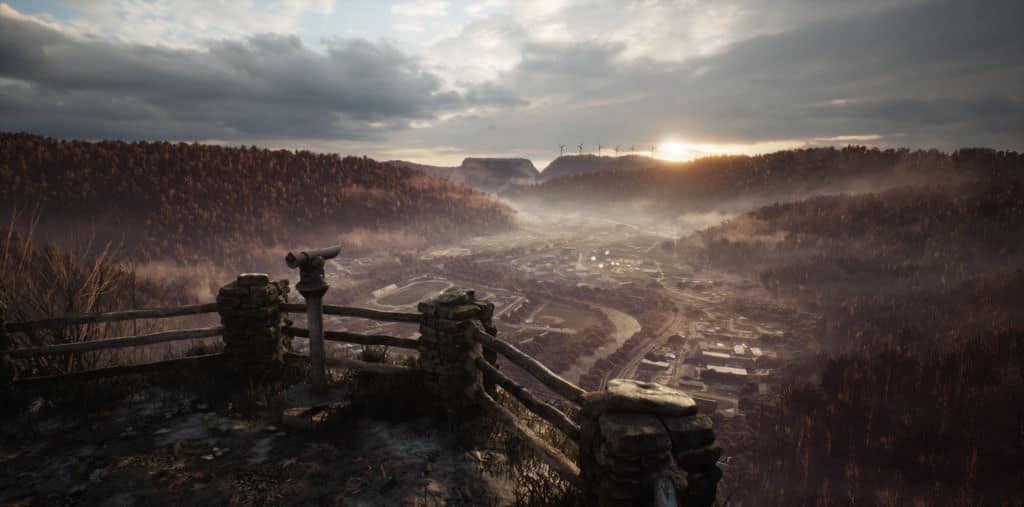Video Gamer is reader-supported. When you buy through links on our site, we may earn an affiliate commission. Prices subject to change. Learn more
Spare a thought for Sam Higgs. We find him stripped to the waist and slumped on a hotel bed, his feet, still encased in yesterday’s trainers, dangling over the edge of the abyss. He is ripped from his stupor by the wrapping of the maid at the door – it’s fifteen minutes past check-out time. What a slob. Now, spare a thought for his dapper doppelganger, who appears rather more prepared for the day, dressed in a worsted wool blazer in venetian stripe, a spotted blue tie, and bifocals. Sam’s problem, as the hero of Twin Mirror, is that he seems markedly less reputable than his own dark side. Dontnod’s problem, as the developer of Twin Mirror, is that the game seems markedly less reputable than its reflections. Of which, there are many.
If you’ve seen the trailer, you may have paused to note the rust belt landscape of the setting, Basswood, Virginia. Sam hurtles past metal chutes and mine dumps, ‘For Sale’ signs swinging in the wind outside tract houses; it’s difficult to shake the feel of True Detective, with its eye for the American carcass. When the demo begins, the parochial feel of the town – visible outside Sam’s hotel room window – bears a shade of Twin Peaks, so invoked by the game’s title.
Then, of course, there’s the third-person adventure mould, which smacks of Dontnod’s breakout game, Life is Strange. That game was similarly charmed by David Lynch’s fascination with small town diners and kooky locals. And what’s this? The powers-that-be have seen fit to bestow Sam with supernatural gifts (though they must have been watching Sherlock, because these, too, have been pinched). He has the power to retreat into his ‘mind palace,’ a dreamy domain with the raw feel of a level editor, walls and floors scrambling into place as if his brain is running without the requisite mid-cycle upgrade.

Sam is a journalist, so his mental powers must come in handy during his investigations (although, if he’s plucking events from his head, the fact-checkers must have a nightmare of a time with him). He is able to deduce and reconstruct events, simulating them in a subconscious dossier for future reference. For Sam, there’s no such thing as going off the record. A curious side effect of his enhanced faculty is his sharply-dressed twin, who shows up to warn Sam off from going into the bathroom. He has a point: someone made an awful mess in there.
When control is passed your way, your time is taken up sleuthing for clues – a dent in the wall, a bloodied shirt in the sink, a cracked phone in the corner. What did he get up to the night before? Once you’ve gathered enough evidence, you switch to the mind palace with a button press and start slotting things into the right order. Quite why the mind palace is necessary isn’t clear; one would think a smashed phone and a dented wall wouldn’t require the largest of leaps. Nevertheless, it’s strangely satisfying when it all comes together and you watch it all play out.
In fact, there is, it must be said, the charm of the cheapjack about Twin Mirror. It will be familiar to anyone familiar with the naff glory of Deadly Premonition. It’s there in the terrible font, which, by itself, could form the basis of an obsession. It’s in the coal-caked palette, which oozes cheap thriller. And it’s at its most pungent in the game’s dialogue. ‘I’m not bleeding, so where’d all the blood come from?’ Sam ponders aloud (I think I remember a similar line from Conan Doyle). And then, alarmingly, ‘Time to stare into my own abyss.’

Dontnod, meanwhile, has managed to stare into anything but, its eyes darting restlessly from Alan Wake to Fahrenheit, from Twin Peaks to Sherlock. It’s one moment of introspection comes in the cribbing of its own recent history. Yet, for all of Twin Mirror’s contrivance and clunk, there is something beguiling in the style of its stagnation.

